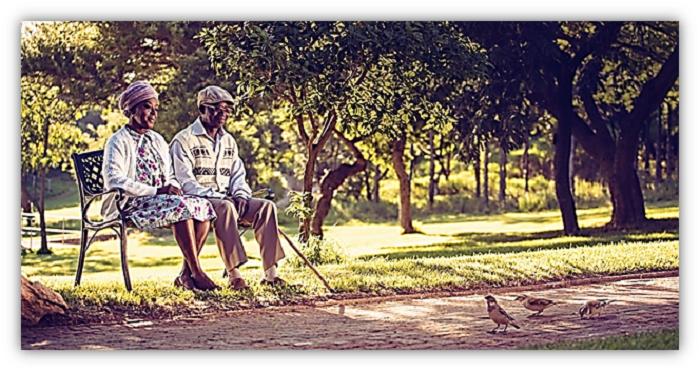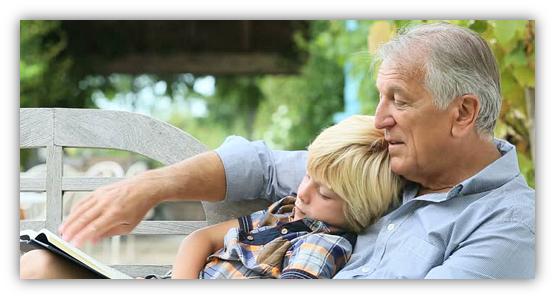Some Reflections on Retirement
Some Reflections on Retirement

Early Signs of Aging⤒🔗
It may happen suddenly or more gradually, but the pattern is always the same. At the age of 40 or thereabouts we begin to realize that we have arrived at the midpoint of our adult years. More than half of life is gone. More time stretches behind than before us. We sense that we are approaching the end of our earthly journey. Sure, there may be quite a few years left yet. Life expectancy in North America is about 72 years for men and 76 for women. Yet the very fact that we talk about what's left says it all.
For many people aging is a reality they find hard to accept. There are the telltale signs: hair turns grey or thins. Wrinkles appear in the face. Stiffness enters the joints. Aches and pains, prescription glasses and hearing-aids become part of daily experience and all too often daily conversation as well.
Preparing for Retirement←⤒🔗
When these and other symptoms of aging are taking place it is time to start preparing for this new phase of our life. But how does one prepare for old age? Is it even possible to do this? Yes, it is, both possible and necessary. All of life is a preparation. Children prepare themselves for life in society by going to school and learning a vocation or trade. Young people spend years preparing for a career in law or medicine or some other profession. Such careers, once attained, last about 40 years at the most-from say ages 25 to 65. But then follow the retirement years, which on average last 13 years.
How will we spend these last years of our life? Most of us have no idea, really. We'd rather not think about that subject, let alone prepare for it. If we make any preparations at all, these are limited to financial matters. Knowing that we need money to live comfortably we try to save as much as possible through investments or other means.
But financial security, important as it is, cannot guarantee that our retirement years will be good years. There are plenty of rich retirees who spend their senior years in varying degrees of boredom. After all, you can only make so many trips around the world and play so many rounds of golf or go on so many fishing expeditions.
Proper preparation, therefore, has more to do with the development and cultivation of the mental, psychological and spiritual dimensions of life.
Doing or Being?←⤒🔗
According to the Swiss psychologist, Paul Tournier, the emphasis during our youth and adulthood is on activity. We work, we strive, we do. But when older, we have to slow down and gradually the emphasis shifts. No longer what we do is decisive, but what we are.
It is precisely here where many older people have problems. Because they cannot do any longer what they once could, they feel useless. And our society only exacerbates the situation by giving the impression that only the young and the strong are useful because they produce; they accomplish; they contribute. The old can no longer participate, so they can be dispensed with. Many retirees are caught in this bind, even many Christians. They too think that they can only prove their worth by staying active and productive as long as possible. Of course, it is a good thing to stay active. Our senior citizens should be allowed to work as long as health permits. In that connection it is a good thing that many governments and businesses are having second thoughts about the wisdom of mandatory retirement.
We should not think, however, that it is only the physically active people who are useful for society in general and the church in particular.
The Bible on the Role of the Elderly←⤒🔗
According to Scripture, the elderly have an important part to play in the covenant community. Their primary task is to teach the young, both by precept and example. Even in ancient pagan societies this was understood. Among the Greeks and Romans the elderly were held in high esteem, higher than among us, I'm afraid.
One reason for this was that in those days the proportion of elderly people was far smaller than it is today, so that it was easier to honour them, simply because of their relative scarcity. Also, cultural patterns did not change much from one generation to the next, so that knowledge and skills could be passed on almost intact from parents to children and grandchildren.
Today that is no longer possible; at least as far as technical skills are concerned. My grandchildren can't learn computer skills from me. And downloading music from Internet to their ipods is not exactly my forte either. It is hard to keep up with all the new gadgets on the market today.
The Transmission of Wisdom←⤒🔗
However, one thing that never becomes outdated is wisdom, especially the wisdom that is rooted in the fear of the Lord. Here is where the task of the elderly comes in. They should be eager to pass on their wisdom accumulated over many years to the generation that will follow them.
Sad to say, not all old people are wise. Scripture also speaks of old fools and this is mentioned as a very sad and shameful thing. Our society has many such people and even in the church one runs into them. They are not necessarily fools in the sense of being silly, but they sure don't show much wisdom or maturity. They are no examples of godliness to their children and grandchildren. There is little in their talk or walk that makes young people jealous of their faith.

What is the problem here? Well, it is obvious that they have not prepared themselves for this phase of their life. They spent a lifetime working, being successful perhaps in their business or whatever employment they were engaged in. Then came retirement. Maybe they were forced into it by poor health or were laid off when the company went bankrupt or they just decided to take early retirement. But whatever the reason, here they are, comfortable perhaps but restless and unfulfilled. Having never been too interested in spiritual or even cultural things, they have time on their hands and they don't know what to do with it. They exist, that's all.
Some Practical Suggestions←⤒🔗
If you don't want to end up like this you need to take some time-tested preventive action. Here's what you should do.
-
Expand your mind and learn a skill other than what your present job requires.
-
Cultivate friendships beginning with your wife who should have been your best friend all along, but who will be very valuable as a friend in your old age, if the Lord spares you for each other.
-
Accept your diminishing role in life. Seniors pathetically hanging on to their positions at work, in business or even in full-time Christian ministry (notice, I say full-time), only harm themselves and others.
-
Take an interest in other people, especially those who are shut-ins and sick. Do some volunteer work in church or for some church related charitable organization like Word and Deed, Come Over and Help, Bibles for Missions, community outreach, etc.
-
Pray for the Church and Kingdom of God and financially support Christian schools as well as evangelistic and missionary ministries.
Above all, prepare for death. Retirement does not end in your retirement or in a nursing home. It ends in death. Here I stand to be corrected. For believers life does not end at death. As the Catechism says: our death is only an abolishing of sin and a passage into eternal life. (LD 16, A.42)
A Glorious Future←⤒🔗
What a glorious prospect that is for all who fear the Lord! Life, especially when we get older becomes difficult. It has to because we live in a sinful and broken world. But if we know Christ we should be able to cope better with our weaknesses, frailties, griefs, sorrows and afflictions, than those who go through life without the Lord. Just as young trees grow, not only by sunshine and rain, but also by storms and tempests, so believers grow in grace and in the knowledge of the Lord Jesus Christ through many hardships and trials. In this way they learn to produce fruits to the honour of God and the well being of their neighbour. Scripture speaks of elderly saints who are still bringing "forth fruit in old age" (Psalm 92:13).
For unbelievers old age is not a ripened fruit, the result of a long and slow process of inner growth. For them life is simply running out. Their sap has dried up and old age brings them no joy. They need external stimuli to keep the spark of life going. But it does not work; it cannot. Bitterness and disillusionment inevitably set in. They wistfully look back to the summer of life, now over. And with more apprehension than they are willing to admit they anticipate the next and final stage: death, which for them means the end of all good things.
Old age is a blessing but only for those who know God and who have loved and served Him. True, as believers we may also feel a twinge of sadness that our best years are over. But when faith is active we may also rejoice in the knowledge that even better years lie ahead. With David we can say at such times: "Thou wilt chew me the path of life: in thy presence is fullness of joy: at thy right hand there are pleasures for ever more" (Psalm 16:11).
Realistic we must be but optimistic we may be as we think of the exceeding great and precious promises God has given us in His Word. By faith we know that even though this tabernacle, this body of ours, will soon be dissolved and end up in the grave, "we have a building of God, a house not made with hands, eternal in the heavens.

"For in this we groan," Paul says, "earnestly desiring to be clothed upon with our house which is from heaven" (2 Cor. 5:2).
I write down these thoughts as one who has recently joined the ranks of the retired. I have almost reached the age of the strong (Psalm 90:10). I hope I am prepared for what lies ahead. By God's grace I may still enjoy good health and expect to stay actively involved in the Lord's work for some time to come, the Lord willing. May God help me practice what I have preached to others, also in this editorial. "O God thou hast taught me from my youth: and hitherto have I declared thy wondrous works."
Now also when I am old and grey-headed, "O God, forsake me not; until I have shewed thy strength unto this generation and thy power to everyone that is to come" (vv.17-18).

Add new comment